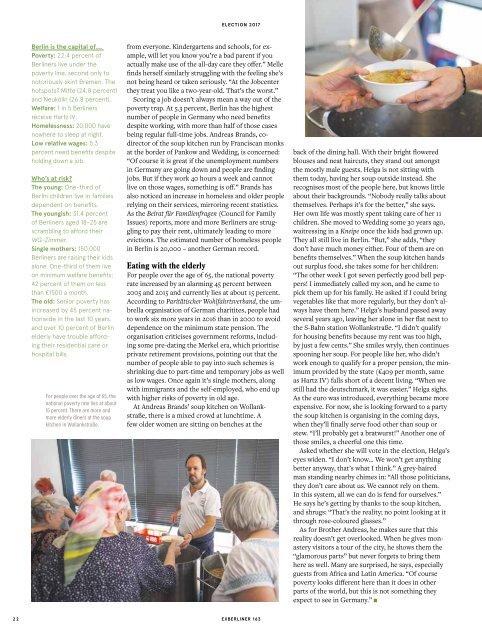EXBERLINER Issue 163, September 2017
You also want an ePaper? Increase the reach of your titles
YUMPU automatically turns print PDFs into web optimized ePapers that Google loves.
ELECTION <strong>2017</strong><br />
Berlin is the capital of...<br />
Poverty: 22.4 percent of<br />
Berliners live under the<br />
poverty line, second only to<br />
notoriously skint Bremen. The<br />
hotspots? Mitte (24.8 percent)<br />
and Neukölln (26.8 percent).<br />
Welfare: 1 in 5 Berliners<br />
receive Hartz IV.<br />
Homelessness: 20,000 have<br />
nowhere to sleep at night.<br />
Low relative wages: 5.3<br />
percent need benefits despite<br />
holding down a job.<br />
Who’s at risk?<br />
The young: One-third of<br />
Berlin children live in families<br />
dependent on benefits.<br />
The youngish: 31.4 percent<br />
of Berliners aged 18-25 are<br />
scrambling to afford their<br />
WG-Zimmer.<br />
Single mothers: 150,000<br />
Berliners are raising their kids<br />
alone. One-third of them live<br />
on minimum welfare benefits;<br />
42 percent of them on less<br />
than €1500 a month.<br />
The old: Senior poverty has<br />
increased by 45 percent nationwide<br />
in the last 10 years,<br />
and over 10 percent of Berlin<br />
elderly have trouble affording<br />
their residential care or<br />
hospital bills.<br />
For people over the age of 65, the<br />
national poverty rate lies at about<br />
15 percent. There are more and<br />
more elderly diners at the soup<br />
kitchen in Wollankstraße.<br />
from everyone. Kindergartens and schools, for example,<br />
will let you know you’re a bad parent if you<br />
actually make use of the all-day care they offer.” Melle<br />
finds herself similarly struggling with the feeling she’s<br />
not being heard or taken seriously. “At the Jobcenter<br />
they treat you like a two-year-old. That’s the worst.”<br />
Scoring a job doesn’t always mean a way out of the<br />
poverty trap. At 5.3 percent, Berlin has the highest<br />
number of people in Germany who need benefits<br />
despite working, with more than half of those cases<br />
being regular full-time jobs. Andreas Brands, codirector<br />
of the soup kitchen run by Franciscan monks<br />
at the border of Pankow and Wedding, is concerned:<br />
“Of course it is great if the unemployment numbers<br />
in Germany are going down and people are finding<br />
jobs. But if they work 40 hours a week and cannot<br />
live on those wages, something is off.” Brands has<br />
also noticed an increase in homeless and older people<br />
relying on their services, mirroring recent statistics.<br />
As the Beirat für Familienfragen (Council for Family<br />
<strong>Issue</strong>s) reports, more and more Berliners are struggling<br />
to pay their rent, ultimately leading to more<br />
evictions. The estimated number of homeless people<br />
in Berlin is 20,000 – another German record.<br />
Eating with the elderly<br />
For people over the age of 65, the national poverty<br />
rate increased by an alarming 45 percent between<br />
2005 and 2015 and currently lies at about 15 percent.<br />
According to Paritätischer Wohlfahrtsverband, the umbrella<br />
organisation of German charitites, people had<br />
to work six more years in 2016 than in 2000 to avoid<br />
dependence on the minimum state pension. The<br />
organisation criticises government reforms, including<br />
some pre-dating the Merkel era, which prioritise<br />
private retirement provisions, pointing out that the<br />
number of people able to pay into such schemes is<br />
shrinking due to part-time and temporary jobs as well<br />
as low wages. Once again it’s single mothers, along<br />
with immigrants and the self-employed, who end up<br />
with higher risks of poverty in old age.<br />
At Andreas Brands’ soup kitchen on Wollankstraße,<br />
there is a mixed crowd at lunchtime. A<br />
few older women are sitting on benches at the<br />
back of the dining hall. With their bright flowered<br />
blouses and neat haircuts, they stand out amongst<br />
the mostly male guests. Helga is not sitting with<br />
them today, having her soup outside instead. She<br />
recognises most of the people here, but knows little<br />
about their backgrounds. “Nobody really talks about<br />
themselves. Perhaps it’s for the better,” she says.<br />
Her own life was mostly spent taking care of her 11<br />
children. She moved to Wedding some 30 years ago,<br />
waitressing in a Kneipe once the kids had grown up.<br />
They all still live in Berlin. “But,” she adds, “they<br />
don’t have much money either. Four of them are on<br />
benefits themselves.” When the soup kitchen hands<br />
out surplus food, she takes some for her children:<br />
“The other week I got seven perfectly good bell peppers!<br />
I immediately called my son, and he came to<br />
pick them up for his family. He asked if I could bring<br />
vegetables like that more regularly, but they don’t always<br />
have them here.” Helga’s husband passed away<br />
several years ago, leaving her alone in her flat next to<br />
the S-Bahn station Wollankstraße. “I didn’t qualify<br />
for housing benefits because my rent was too high,<br />
by just a few cents.” She smiles wryly, then continues<br />
spooning her soup. For people like her, who didn’t<br />
work enough to qualify for a proper pension, the minimum<br />
provided by the state (€409 per month, same<br />
as Hartz IV) falls short of a decent living. “When we<br />
still had the deutschmark, it was easier,” Helga sighs.<br />
As the euro was introduced, everything became more<br />
expensive. For now, she is looking forward to a party<br />
the soup kitchen is organising in the coming days,<br />
when they’ll finally serve food other than soup or<br />
stew. “I’ll probably get a bratwurst!” Another one of<br />
those smiles, a cheerful one this time.<br />
Asked whether she will vote in the election, Helga’s<br />
eyes widen. “I don’t know... We won’t get anything<br />
better anyway, that’s what I think.” A grey-haired<br />
man standing nearby chimes in: “All those politicians,<br />
they don’t care about us. We cannot rely on them.<br />
In this system, all we can do is fend for ourselves.”<br />
He says he’s getting by thanks to the soup kitchen,<br />
and shrugs: “That’s the reality; no point looking at it<br />
through rose-coloured glasses.”<br />
As for Brother Andreas, he makes sure that this<br />
reality doesn’t get overlooked. When he gives monastery<br />
visitors a tour of the city, he shows them the<br />
“glamorous parts” but never forgets to bring them<br />
here as well. Many are surprised, he says, especially<br />
guests from Africa and Latin America. “Of course<br />
poverty looks different here than it does in other<br />
parts of the world, but this is not something they<br />
expect to see in Germany.” n<br />
22<br />
<strong>EXBERLINER</strong> <strong>163</strong>


















